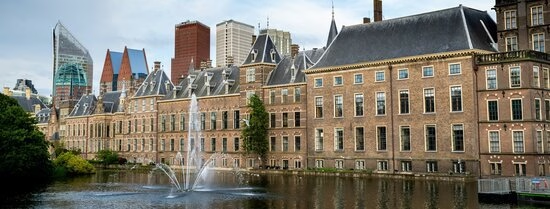The gap between rich and poor is widening in the Netherlands. People also experience less contact with people from other groups, such as those with a different background, income or level of education. Are we growing apart as a society? Political philosopher Jamie van der Klaauw explains: 'The biggest problem is that many people are dropping out.'

Polarisation is part of politics
Is the Netherlands growing apart? The political philosopher immediately thinks of polarisation. 'It is a hot topic. But it is not new. Politics does not exist without polarisation.'
Polarisation means that oppositions between groups become greater. As a result, people often think only in "for" or "against". 'As a politician, you try to convince people. That means that sometimes you have to put more weight on the differences. In the Netherlands, this is more difficult. We are used to the polder model. We quickly make up. But that model is now under pressure.'
What is the problem of polarisation? People drop out!
'Polarisation in itself is not bad', Van der Klaauw explains. The problem is actually that people drop out. They no longer feel at home in society. This happens in two ways:
- At the top
Many wealthy Dutch people emigrate. They leave for countries with lower taxes, such as Monaco or Belgium. So they contribute less to our society and undermine solidarity.
- At the bottom
This is because of poverty, low literacy or because they are excluded. People can no longer participate properly in society. They become alienated.

Society is divided
The reason why people drop out, according to the scientist, is due to fragmentation. He observes that in society, many things are taken apart or pitted against each other. 'More people used to have permanent jobs with good agreements through unions. Now there are more and more self-employed people. They make those agreements themselves. That makes it harder to stand strong together. Think of meal delivery companies. More and more people are struggling to make ends meet. As a result, you also have less time to be interested in politics or for other activities. You get into a downward spiral of individualisation. As a result, building solidarity and collectivity is much harder.'
Jamie sees a paradox in this: 'Individuality always comes about through collectivity. In our society, we arrange things by thinking in collectives. On the contrary, I am in favour of individual freedom. But individualisation as a process in which you actually get less individual freedom and become more dependent on market systems, I think is a bad development.'
Hello neo-feudalism, goodbye neo-liberalism
For the past 50 years, we worked mainly through the free market: neo-liberalism. Now experts see a new system: neo-feudalism. 'In the Middle Ages, you worked for a lord who owned land. You had little choice. We call that feudalism. Now it's not about land, it's about digital platforms (neo-feudalism)', Jamie says.

'Take Uber Eats, which does not see itself as an employer. They only link requests from restaurants to individual delivery drivers. It is a kind of digital feudal lord. As an employee, you only interact with the platform. That makes it totalising and gives it something feudal. It is not a market and you have no choice as a delivery person. You can't argue about the price. You also see it in other sectors where self-employed workers are getting the upper hand. Think of journalism.'
Tram line must pay for itself
We also see this shift in society reflected in political aspects. Public infrastructure is increasingly under discussion. 'Twenty years ago, we did not think that a tram line had to be economically profitable. It was a public service where you wanted certain people to get around properly. That is different now.'

The political philosopher cites the example of tram line 4 in Rotterdam. The tram line first ran from the wealthier Hillegersberg area to the poorer Marconiplein area. Plans to shorten the line caused a lot of protest from Hillegersberg. Eventually, the tram line was shortened only in the poorer western part of the city.
'A strange vicious circle arises. The less well-off people in Rotterdam-West, who are more dependent on public transport, lose a tram line. They cannot unite and resist. And the more affluent people in Hillegersberg can unite and resist, and therefore keep the tram line.'
Keep an eye out for the other person
The system is not always evil, but the effect is clear: the poor get less, the rich keep their benefits. As a result, people drop out of society.
According to the political philosopher, there is an important insight that works against polarisation and holds democracy together: that we see ourselves as part of the political systems, as much as the other. 'Politics is something we do together. With that, we "produce" democracy. Take that into your worldview and see polarisation within it as part of the political struggle. You have to fight that battle without saying that the other person has no right to exist and therefore should not be allowed to participate. Democracy is something we must think, make and carry together.'

- Researcher
- More information
More science stories? Check out our online magazine Erasmus Extra.
Press
Do you have any questions about Van der Klaauw or his research? Please get in touch with press officer of Erasmus School of Philosophy Eddie Adelmund via e-mail or by calling (010) 408 89 79.- Related content
